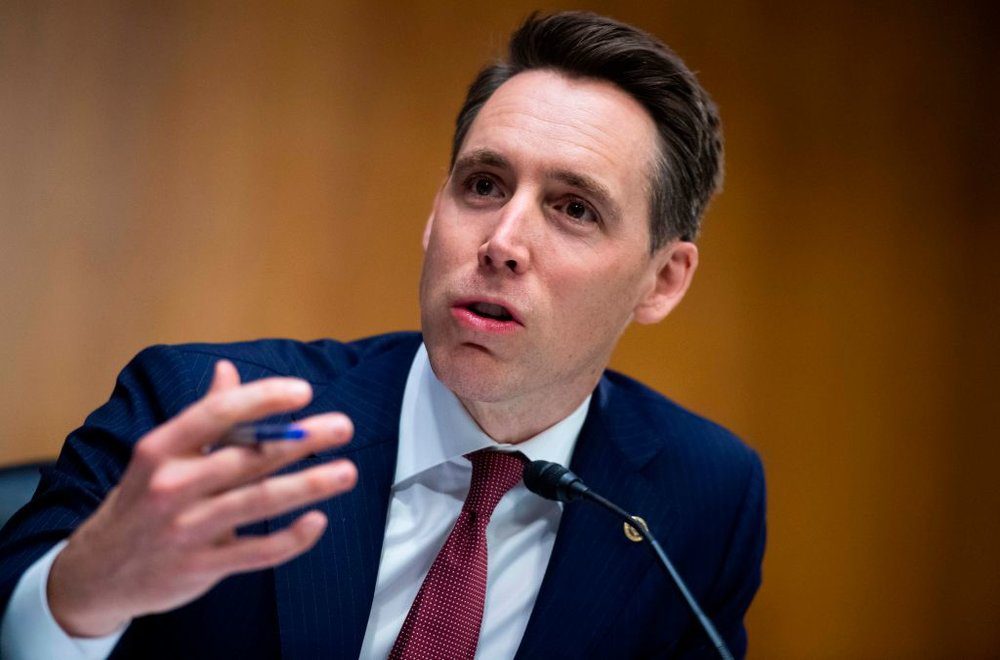
Sens. Josh Hawley and Bernie Sanders have rushed in at the eleventh hour demanding personal stimulus checks. It’s a high wire act. It could kill the bill.
Senator Josh Hawley, R-Mo., asks a question during the Senate Judiciary Committee hearing titled Police Use of Force and Community Relations, in Dirksen Senate Office Building in Washington, DC, on June 16, 2020. (Photo by Tom Williams / POOL / AFP) (Photo by TOM WILLIAMS/POOL/AFP via Getty Images)
After an utter farrago of election year negotiation, Congress had seemed poised to close a deal for a new, trillion dollar stimulus.
This measure would come as the pandemic in the United States spiked with a vengeance. It would come amidst an historically messy presidential transition with the incumbent taking every flyer available to him to stay in office. And it would come amidst a suddenly quite shaky economy— and after if it had somewhat recovered from the spring collapse faster than many economic experts had expected.
The deal would also come too late to save Donald Trump. That was not lost on the president and his allies as House Speaker Nancy Pelosi blithely conceded this month that politics had played a role in her previous handwringing.
Yes, Pelosi is far happier to work now in the shadow of President-elect Joe Biden. Yes, the outgoing president and the speaker are not on speaking terms. Yes, Treasury Secretary Steven Mnuchin leads the negotiations for the administration on the Hill. And yes, in the bleak early winter, a tentative deal had finally been reached this month for a new $900 billion aid package.
The early proposal drew some mockery on social media. How could Congress spend another trillion, without issuing the personal stimulus checks for $1200 that had been so popular in the last round? It seemed no one in the legislature was asking this, at least publicly, until the youngest member of the Senate asked President Trump, “wait, how indeed?”
Sen. Josh Hawley, R-Mo., spoke with Trump by phone last Saturday while he was on Air Force One, amidst his travels to campaign events (for Sens. David Perdue and Kelly Loeffler, if not himself) in Georgia. What followed was something of a chain reaction, in a town grown accustomed to legislative stasis— especially in the latter part of 2020.
Hawley said earlier this week that the president should veto the package without the checks— setting up the prospect of a second, major veto this month (the White House is also mulling rejection of the National Defense Authorization Act). Then, Senate Majority Mitch McConnell and House Minority Leader Kevin McCarthy responded, coming out in favor of $600 checks.
Then, Hawley teamed with Bernie Sanders.
“Congress cannot go on recess without providing this $1,200 emergency assistance to the American people in their time of need,” Sanders said this week. “I look forward to working across the aisle with Senator Hawley to ensure that the United States Senate passes this amendment.” Sanders made his case: “In the midst of this terrible pandemic and economic crisis, this amendment would make certain that working families get the urgent, direct support they need to survive.” Said Hawley: “It would be a dereliction of duty if Congress adjourns for Christmas without having a vote on providing working families with direct payments.”
Sanders, unlike Hawley, has not publicly urged a veto sans checks.
But if the unlikely duo acts as one — figures both with presidential-level ambition who command the affinity of their parties’ grassroots — it could convulse the reality on the Hill. Up in the air: will the senators accept the $600 offer from McConnell and McCarthy, if that is all there is for the taking? Or will Hawley use his clout with the White House to work to kill any half measure?
Hawley, only a freshman, has shown flair for the hard line before. Before the sudden death of Justice Ruth Bader Ginsburg and the accession of Amy Coney Barrett, the socially conservative Hawley drew a similar line in the sand. Hawley said he would not vote to confirm any high court nominees who did not confirm she believed that Roe v. Wade — which declared state-level early abortion restrictions a violation of the Constitution — was wrongly decided.
To the senator’s critics, Barrett stopped well short of any such confirmation. But to private defenders of Hawley, Barrett left enough breadcrumbs to affirm the spirit of his demand. Now-Justice Barrett authored a 2013 law review article in which she laid out a list of so-called “super precedents” that the Supreme Court could not revoke, these included Marbury v. Madison, which established the court’s modern power, and Brown v. Board of Education, which flipped the demolition switch on white supremacist racial segregation.
The question now is how hard will Hawley, with a keen eye to 2024, push the envelope? If he were to succeed, he could become something close to a household name— as the young man who went to Washington, and secured the voter that desperately-needed personalized check. And if he were to fail, his critics, especially on Wall Street, will see his hand in making a dark winter perhaps even darker.
But frustration has mounted with government spending since the last economic crisis, in 2008. Hawley asks, is it even worth it for the government to dig deeper, if it refuses to show the personal touch (by far the most acclaimed facet of the aid)?
More and more are concluding “no.”
This post originally appeared on and written by:
Curt Mills
The American Conservative 2020-12-12 18:03:00
